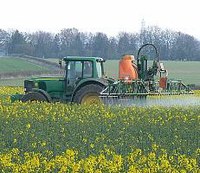(BRUSSELS) – The European Commission called Wednesday for the EU Plants Animals Food and Feed Committee to meet on June 6 to discuss a limited extension of the authorisation of the herbicide glyphosate.
The Commission says the extension for glyphosate, an active substance used for the production of pesticides, should stand until the European Chemical Agency gives its scientific assessment on the substance.
The decision drew immediate criticism from environmental campaigner Greenpeace, which says the Commission’s plan ignores scientific evidence that glyphosate is “a probable cause of cancer” and that it fails to limit human exposure to the herbicide.
The Commission says the EU’s authorisation procedure as regards pesticides is “the strictest in the world”. It takes years of scientific assessment before an active substance is authorised or renewed at EU level.
The Commission says it has been aiming for a solution that commands widest possible support of the EU Member States. It says that despite a majority of Member States being in favour of renewal, no qualified majority has been reached.
The European Parliament has expressed deep concerns about the carcinogenicity and endocrine disruptive properties of the herbicide, which is used in many farm and garden applications.
MEPs have said the EU should renew marketing approval for 7 years, instead of 15, but for professional uses only. In its April vote, it called for an independent review and publication of all the scientific evidence that the European Food Safety Authority (EFSA) used to assess glyphosate.
The Commission stresses that EU approval of an active substance means only that Member States can authorise plant protection products on their territory, not that they are obliged to do so.
The Commission says if there is no EU approval, Member States will no longer have the choice: the authorisation expires on the 1st of July. They would then have to withdraw the authorisations for plant protection products containing glyphosate from their market.



